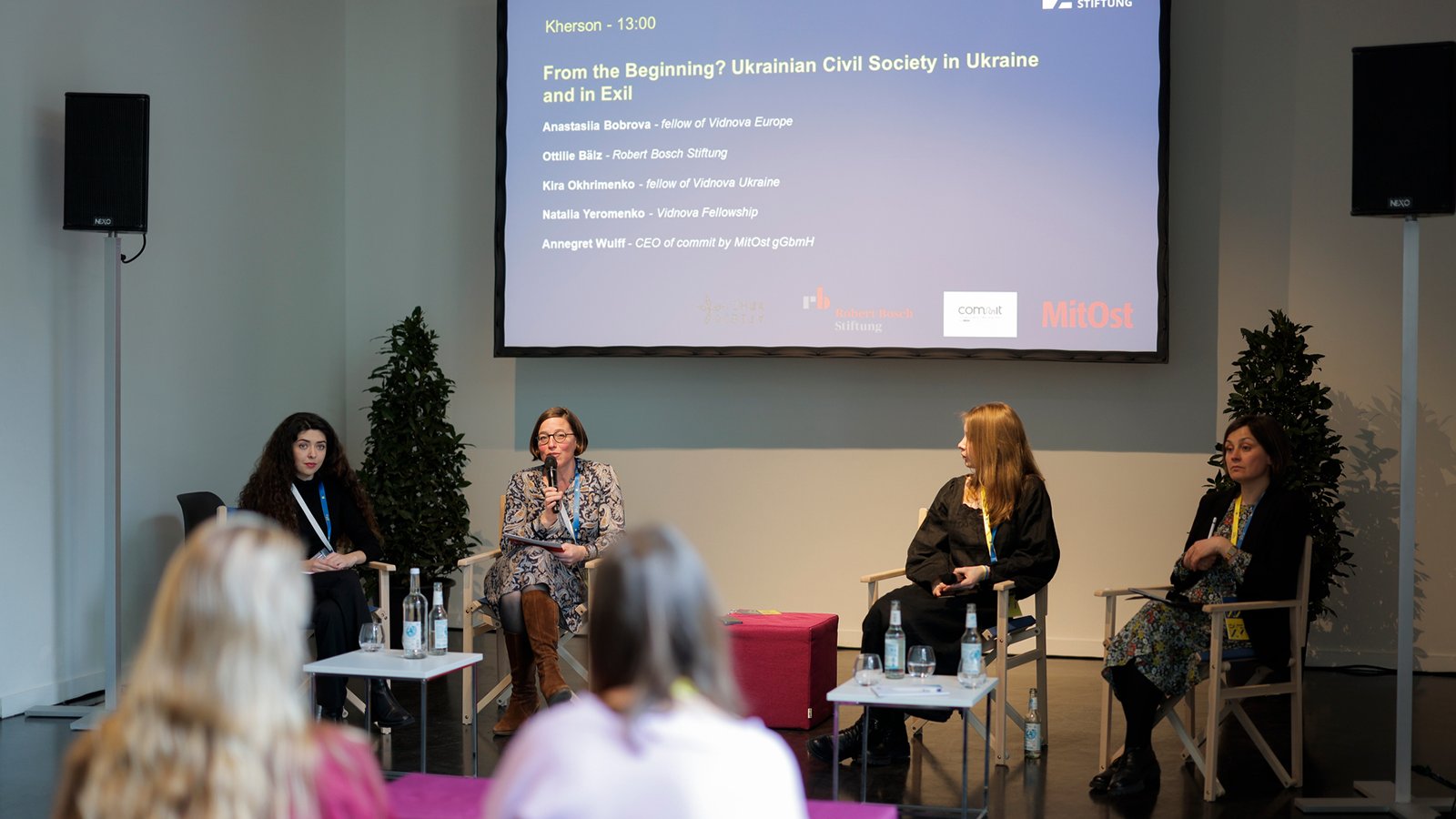Together with our partners at Café Kyiv
On February 27, the Konrad Adenauer Stiftung invited guests to Café Moscow in Berlin, which was renamed for a few days as part of an art campaign, "Café Kyiv - We Choose Freedom”. The Robert Bosch Stiftung, the iac, commit gGmbH as well as MitOst and its partners and alumni from Ukraine participated in five of the nearly 50 panel discussions, presentations, readings and concerts.
In his welcome remarks, Ukrainian ambassador Oleksii Makeiev said he was pleased to see that so many hearts were “beating together in blue and yellow today". He thanked Germany for taking in around one million of his countrymen and said it showed how Germany and Ukraine had grown closer over the past year.
This connection could be felt throughout the day. In personal conversations, the Ukrainian guests repeatedly said they could hardly reconcile the different realities of their homeland and Berlin. Some, like the writer Jurko Prochasko, had traveled abroad for the first time since the beginning of the war. At the same time, they were pleased with the overwhelming interest in the event. More than 2,500 people registered to attend Café Kyiv.
The future of Ukrainian cities
In one of the rooms, visitors could view Ukrainian cities before and after the Russian attacks in a 360-degree panorama using virtual reality glasses. Many buildings had been reduced to charred piles of blackened rubble. Missile attacks had razed bridges, apartment buildings, churches and hospitals to the ground. What will these Ukrainian cities look like in the future?
Urban planner Daryna Pryrogova of ReStart Ukraine presented an overview of reconstruction planning for Ukrainian cities and villages, showing a model project in the formerly occupied city of Chernihiv in the country’s northeast. While the initial focus last year was on providing short-term refuge and guaranteeing the safety of buildings, the focus now is on the future. This will require forward-looking, ecological and people-centered urban planning that both reflects the experience and history of the siege and takes into account global warming scenarios, Pryrogova stressed. What should be preserved, what should be rebuilt – and what can be created from scratch? The NGO ReStart Ukraine is actively involved in designing the country's reconstruction by providing administrators and urban planners with an open access knowledge database and concrete examples, pointing out risks and shortcomings, and offering suggestions.
The role of civil society in the reconstruction of Ukraine
Around five million people have left Ukraine since February 24, 2022 – people who are urgently needed for a vibrant civil society, stressed Annegret Wulff, Managing Director of commit gGmbH. It is important to join forces and take action now instead of just being reactive, as was the case in the early days, Wulff said.
What role civil society in Ukraine and in exile can play in reconstruction was the focus of an all-female panel, in which Wulff discussed the issue with two Vidnova Fellows and Nata Yeromenko, coordinator of the Vidnova Fellowship program for women civil society actors from Ukraine, as well as Ottilie Bälz, Head of Global Issues and Coordinator for Ukraine Engagement at the Robert Bosch Stiftung. Bälz stressed that the various organizations inside and outside Ukraine needed to join forces and speak out with a strong voice. The Ukrainian participants also emphasized what was particularly needed after the first phase of emergency aid: that those who had left their homes were not lost to civil society but could take part in reconstruction from elsewhere in Europe. The Vidnova fellowship program has expanded since the beginning of the war – for example, giving women like social entrepreneur Kira Okhrimenko the opportunity to develop her project with older women in rural Ukraine. Fellow Okhrimenko warned that many Ukrainians have worked ceaselessly for others since the war began and were facing burnout. Therefore, she said, a support system is urgently needed.
Grassroots programs for artists, museums and artworks
The three cultural workers from Kyiv, Alona Karavai, Serhiy Klymko and Olha Honcher, reported how they had launched the first appeals for help to evacuate works of art within a few days of the Russian invasion, provided financial assistance to around 900 artists in need, and prepared the exhibitions and concerts during the war. At the same time, they quickly built up an online archive of artworks, artists and institutions. Through artist-in-residence programs, they created the framework for art to emerge depicting the war and a country in a state of emergency. With a twinkle in her eye, gallery and residency project co-founder Alona Karavai says, "The differences of opinion between those making art have taken a back seat since we began our work. After the war, we can get back to the question of who is best."
Café Moskau in Berlin was renamed for a few days into "Café Kyiv"
German premiere of the wartime opera “Lullaby for Mariupol”
The finale was the opera "Lullaby for Mariupol", which premiered in Berlin. Mariupol had become a symbol of Ukrainian resistance since 2014. Within a few days, the city was largely destroyed by Russian forces in the spring of 2022. Shortly before, the Ukrainian composers Roman Grygoriv and Illia Razumeiko had composed a piece for Bandura entitled "Mariupol," from which the opera emerged. Only about three weeks after the war began, it had premiered in Kyiv.
At Opera Aperta's performance in Berlin, three musicians played string instruments while three singers alternated between traditional lullabies and lamentations. Meanwhile, two large video screens displayed war scenes that repeatedly morphed from many small pixels into mosaics, only to disintegrate. These included rare footage of 6th and 7th centuries’ Mariupol mosaics, which were destroyed during the siege of the city by Russian forces in March 2022.

